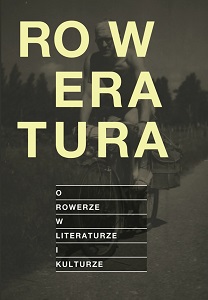„AUTOMOBILU NIE MA. ALE JEST ROWEREK I STARUSZEK Z ROWERKIEM”, CZYLI KILKA SŁÓW O NOCNYM CYKLIŚCIE Z UMARŁEJ KLASY TADEUSZA KANTORA
“THE AUTOMOBILE IS GONE. BUT THERE IS A BIKE AND AN OLD MAN WITH A BIKE”, A FEW WORDS ON NOCTURNAL CYCLING IN TADEUSZ KANTOR’S THE DEAD CLASS
Author(s): Magdalena Skrzypczak
Subject(s): Language and Literature Studies, Fine Arts / Performing Arts, Studies of Literature
Published by: Stowarzyszenie Czasu Kultury
Keywords: bio-object;Tadeusz Kantor;hybrid;bicycle in literature;bicycle in culture;bicycle theory;
Summary/Abstract: PL: Nawiązując do definicji i etymologii bio-obiektu, autorka analizuje jedną z egzemplifikacji tego osobliwego tworu – postaci Staruszka z Rowerkiem. W Umarłej klasie Kantor reinterpretuje tę postać, przydając jej zabawkę z dziecinnych lat. Tekst jest próbą odpowiedzi na pytania, w jakim sensie hybrydyczna postać Staruszka z Rowerkiem jest sygnałem niemożności scalenia „resztek” przeszłości oraz czym był dla Kantora ten „potworny okaz antropologiczny”? W Umarłej klasie nocny cyklista – więzień jednego gestu – skazany jest na wieczny powrót i powtórzenie. Jaką zatem funkcję pełnią Staruszek i jego Rowerek?
EN: The article makes reference to the definition and etymology of the bio-object in order to analyze one example of this peculiar creature – the character of the Old Man With a Bike. In his play The Dead Class, Kantor reinterprets this character, giving him a toy from his childhood years. The text is an attempt to answer the questions, in what sense is the hybridized form of the Old Man With a Bike a sign of the inability to merge “remnants” of the past and what did this “monstrous anthropological specimen” mean for Kantor? In The Dead Class the nocturnal cyclist – the prisoner of a single gesture – is doomed to eternal return and repetition. What therefore is the function of the Old Man and his Bike?
Book: Roweratura. O rowerze w literaturze i kulturze
- Page Range: 99-115
- Page Count: 17
- Publication Year: 2015
- Language: Polish
- Content File-PDF

